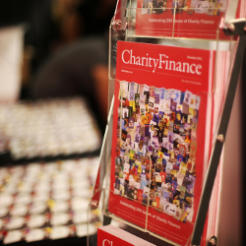Ian Allsop’s column has been dispensing cynical sarcasm since 2010.
Before I get on with the main thrust of this month’s musings, I would just like to say to the Charity Finance Group (established 1987), don’t think I didn’t notice that you put the date of your annual dinner back by a week last month, in an attempt to stop me writing about it.
I also note that Charity Commission chair William Shawcross has just called for a debate on the meaning of charity (established 1601), to which charity will no doubt respond by asking for a debate on the meaning of William Shawcross.
But what I want to talk about this month is time (established 13.7 billion years ago). It is quite common for businesses or products to reference the year in which they were started – for example, Kronenbourg 1664 (other lagers are available) or Hovis, baking bread since 1886. Indeed there is a rich history of brands using their own history in nostalgic advertising.
Mark of quality
Demonstrating longevity suggests companies are doing something right, and so lends an automatic air of quality. Of course this doesn’t always work – the Daily Mail was launched in 1896, for example – but there is an implied sense of solidity behind that distant date which provides the customer with confidence.
However, recently, I have noticed businesses having things like ‘established in 2011’ on their branding. This may reflect the shaky nature of the economy and the fact that keeping going for even two years is no small achievement in our fickle, short-attention-spanned, fast-paced society.
There is the associated concern to me (established 1971), as I grow older and ponder the march of time, that I increasingly find organisations I think of as having been around for ever were actually set up well within my lifetime.
If longevity is a hallmark of quality then the fact that Charity Finance (established 1990) has reached its 200th issue is something to be proud of – it’s the Sachin Tendulkar of charity sector publishing.
To mark this auspicious achievement the publisher is hosting a party and, if for some unbeknown reason you are reading this at that event, then do say hello; I am probably lurking by the canapés.
If you hadn’t already guessed, the celebration of reaching an arbitrary milestone – that is only really significant because our numbering system uses a base of ten – enables me to indulge in some reminiscing about the magazine’s history.
They say that if you can remember reading the first issue of Charity Finance then you weren’t really there. It started life as NGO Finance and its principles of high-quality guidance, information, research and analysis haven’t altered since; I even suspect some of the contributors to that first issue are still dispensing the same sage advice today.
The magazine was still called NGO Finance when I was recruited as a cub journalist in February 2001.
When I arrived for my first day, however, I was told that the name had changed to the admittedly less confusing Charity Finance, which was particularly pleasing given the amount of time I had spent since my successful interview explaining patiently to people what an NGO was. My first day could have ended in disaster as I almost sliced off the finger of the then-editor, while grappling with the iron window grilles we had in the newsroom. Happy times.
History began here
Back in those days, of course, we barely knew how to use a phone let alone hack into one. My first issue was number 72, and I hope that no-one is ever heard to say that is when the decline set in. I became editor for the 103rd issue and my final one was number 151. This column started in edition 163.
I haven’t done an in-depth analysis, but I guess that the three most commonly used words over the 200 issues (apart from charity) have been: accounts, Sorp and Commission; closely followed by public (an editor’s nightmare-scenario, letter-missing word) and benefit.
Financial experts have put the restricted fun into restricted funds, and taken the ‘ow’ from endowment. IT columnist John Tate is now on his 98th Windows upgrade.
And long may it continue – as I need the work. Here’s to December 2023 and the 300th issue. I’m off to start thinking about what I am going to write for that.
Ian Allsop is a freelance editor and journalist, and regular contributor to Charity Finance.









